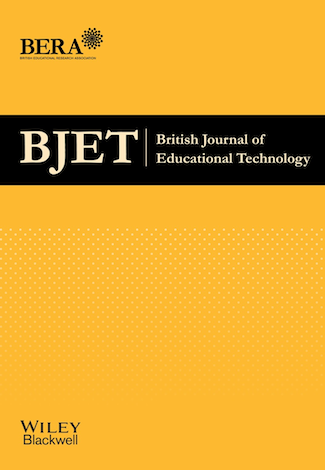An issue of British Journal of Educational Technology has just been added to LearnTechLib.
The table of contents is available here: https://www.learntechlib.org/j/BJET/v/50/n/3/
Contents
The creation of digital artefacts as a mechanism to engage students in studying literature
Geoff Walton, Mark Childs & Gordana Jugo
The aim of the project was to motivate school students to learn about the national literature of their own and others’ countries. Engagement was fostered via the creation of digital … More
Sociotechnical co‐evolution of an e‐Learning innovation network
Nancy Law & Leming Liang
This paper reports on a longitudinal study of a network of 10 special education needs schools over a span of 11 years that leveraged the opportunity offered by a government‐funded … More
Advance organizers in videos for software training of Chinese students
Hans van der Meij
The effectiveness of demonstration‐based training (DBT) videos for software training has been investigated for a Western audience. These studies have generally found that the demonstration videos significantly enhanced self‐efficacy and … More
School leaders’ practices for innovative use of digital technologies in schools
Marcia Håkansson Lindqvist
School leaders’ practices to support the innovative use of digital technologies for teaching and learning and the conditions for technology‐enhanced learning were studied in a 1:1 laptop initiative in two … More
Towards the successful integration of e‐learning systems in higher education in Iraq: A student perspective
Nisreen Ameen, Robert Willis, Media Noori Abdullah & Mahmood Shah
This study aims to analyse the factors that can explain the adoption and effective use of a new e‐learning system in Iraq. To achieve this, it uses a selection of … More
Comparing paper‐based and electronic multiple‐choice examinations with personal devices: Impact on students' performance, self‐efficacy and satisfaction
Andrea Nardi & Maria Ranieri
Nowadays the size of university classes along with the growing number of students to be tested for final examination raise unprecedented challenges relating to the management, monitoring and evaluation of … More
Social scholarship revisited: Changing scholarly practices in the age of social media
Christine Greenhow, Benjamin Gleason & K. Bret Staudt Willet
This conceptual exploration revisits a key question from earlier work (Greenhow & Gleason, 2014): What is scholarship reconsidered in the age of social media? Social scholarship is a framework that … More
Flipped learning and parent engagement in secondary schools: A South Australian case study
Melissa Bond
Parent involvement in and engagement with children’s learning has been shown to strongly influence student achievement, engagement, motivation and school completion. However, parent involvement decreases once students reach middle school, … More
How does principal e‐leadership affect ICT transformation across different school stages in K‐12 education: Perspectives from teachers in Shanghai
Bian Wu, Xiaoxue Yu & Yiling Hu
With the continuous deployment of ICT in K‐12 education, strong access but weak uptake has become the greatest challenge for ICT implementation in schools. As the pioneer of China’s K‐12 … More
By design: Professional learning ecologies to develop primary school teachers’ makerspaces pedagogical capabilities
Michael Stevenson, Matt Bower, Garry Falloon, Anne Forbes & Maria Hatzigianni
Makerspaces embody a growing movement of educators promoting constructionist learning with physical materials and digital technologies such as 3D design and 3D printing. As it gains traction in K‐12 settings, … More
Teacher educators as gatekeepers: Preparing the next generation of teachers for technology integration in education
Jo Tondeur, Ronny Scherer, Evrim Baran, Fazilat Siddiq, Teemu Valtonen & Erkko Sointu
This study aims at investigating the profiles of teacher educators in order to explore their ability to prepare preservice teachers for technology integration in education. Specifically, the current study examines … More
Integrating games as a means to develop e‐learning: Insights from a psychological perspective
Melody M. Terras & Elizabeth A. Boyle
Although the Education sector has pioneered the use of technology, the pace of technological change has outstripped the slower processes of theoretical development and critical reflection, so the field is … More
Earth surface modeling for education: How effective is it? Four semesters of classroom tests with WILSIM‐GC
Wei Luo, Thomas J. Smith, Kyle Whalley, Andrew Darling, Carol Ormand, Wei‐Chen Hung, Jui‐Ling Chiang, Jon Pelletier & Kirk Duffin
This paper presents results from a randomized experimental design replicated over four semesters that compared students’ performance in understanding landform evolution processes as measured by the pretest to posttest score … More
Devices and desires: Competing visions of a good education in the digital age
Angela E. McFarlane
The long anticipated ubiquity of digital technologies is now established in the developed world. The manifestations and consequences are not entirely as predicted, perhaps nowhere more so than in the … More
A study of the facilitation of cross‐cultural understanding and intercultural sensitivity using speech‐enabled language translation technology
Rustam Shadiev, Ai Sun & Yueh‐Min Huang
We proposed speech‐enabled language translation (SELT) technology that consists of speech‐to‐text recognition (STR) and computer‐aided‐translation (CAT) systems to support intercultural communication. When the participants spoke in their native languages, the … More
The relationships between social participatory roles and cognitive engagement levels in online discussions
Fan Ouyang & Yu‐Hui Chang
Understanding the relationship between social interaction patterns and cognitive engagement levels has critical implications on collaborative learning theory, pedagogy, and technology. This study used a multi‐method approach to examine the … More
Exploring the roles of school leaders and teachers in a school‐wide adoption of flipped classroom: School dynamics and institutional cultures
Yanyan Sun & Fei Gao
While the development of digital technologies provides generous resources for educational practices, how the use of information and communication technology (ICT) supports instructional reforms in schools still needs further exploration. … More
The effects of mind games in math and grammar courses on the achievements and perceived problem‐solving skills of secondary school students
Turgay Demirel & Turkan Karakus Yilmaz
The goal of this study is to determine the effectiveness of mind games played by secondary school sixth grade students as classroom activities in math and grammar courses on their … More
Fostering online learning at the workplace: A scheme to identify and analyse collaboration processes in asynchronous discussions
Teresa Schaefer, Johanna Rahn, Tobias Kopp, Claudia Magdalena Fabian & Alan Brown
Research has shown that providing participants with high‐quality learning material is not sufficient to help them profit most from online education. The level of interaction among participants is another key … More
14 more papers are available at https://www.learntechlib.org/j/BJET/v/50/n/3/

